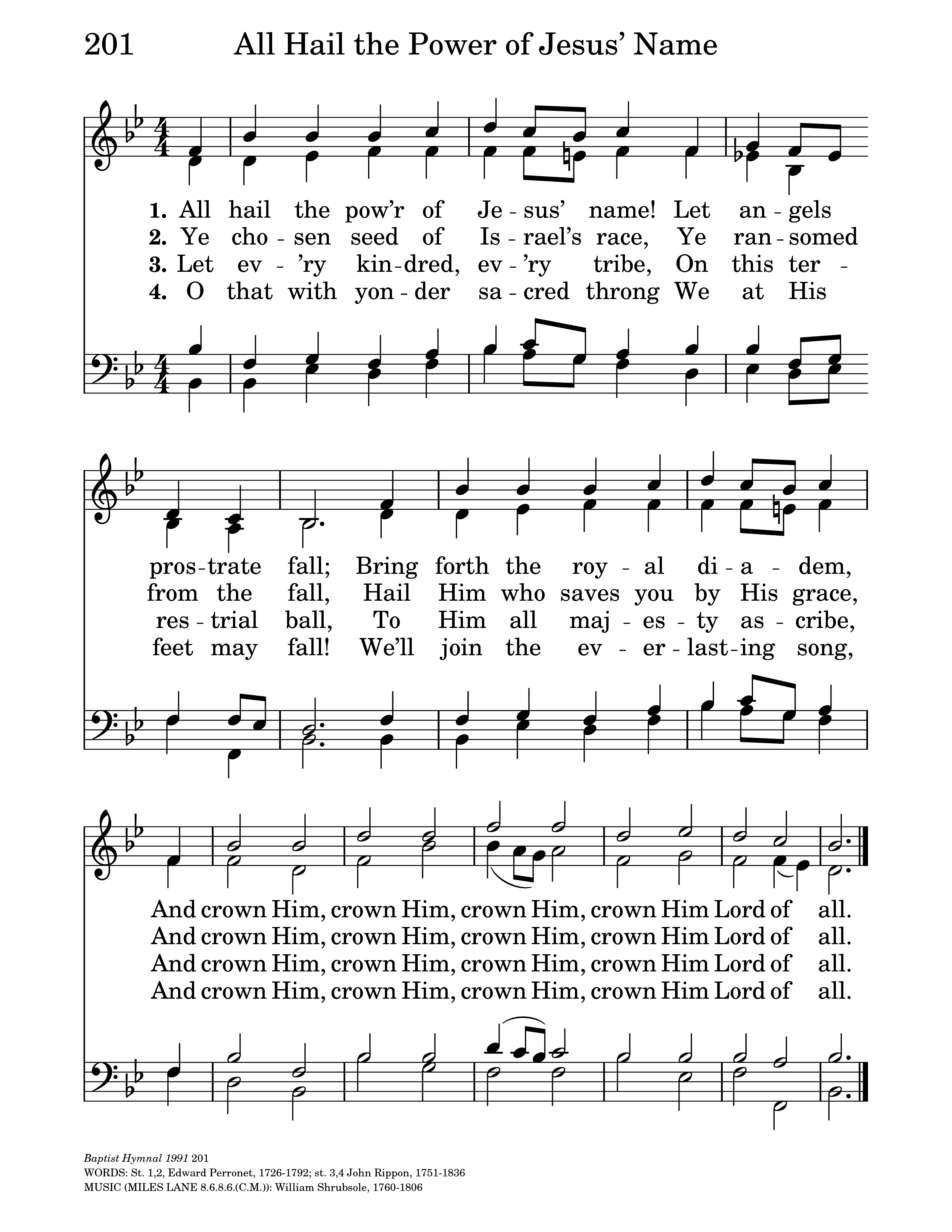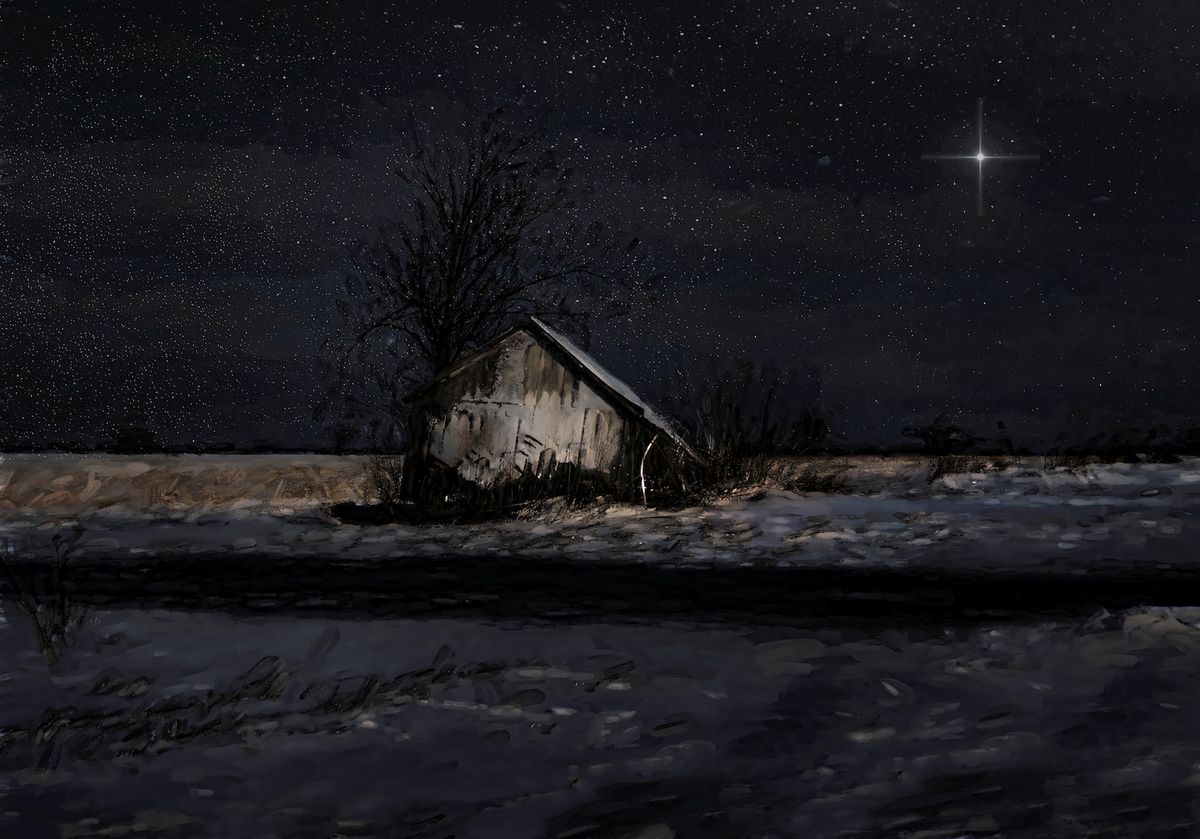All Hail the Power of Jesus' Name
By Edward Perronet
Lyrics
Let angels prostrate fall.
Bring forth the royal diadem,
and crown him Lord of all.
Bring forth the royal diadem,
and crown him Lord of all!
now ransomed from the fall,
hail him who saves you by his grace,
and crown him Lord of all.
Hail him who saves you by his grace,
and crown him Lord of all!
responsive to his call,
to him all majesty ascribe,
and crown him Lord of all.
To him all majesty ascribe,
and crown him Lord of all!
we at his feet may fall!
We'll join the everlasting song
and crown him Lord of all.
We'll join the everlasting song
and crown him Lord of all.
Bible Reference
Revelation 19:12, 16
About This Hymn
Author: Edward Perronet (1726–1792), altered by John Rippon (1751–1836)
Tune: “Coronation” – Oliver Holden (1765–1844)
Other Tunes: “Miles Lane” – William Shrubsole (1760–1806); “Diadem” – James Ellor (1819–1899)
Meter: CM (Common Meter, 8.6.8.6 with Alleluias)
Scripture Reference: Revelation 19:12, 16; Revelation 4:11
"Thou art worthy, O Lord, to receive glory and honor and power: for Thou hast created all things, and for Thy pleasure they are and were created." – Revelation 4:11 (KJV)
Often referred to as the “National Anthem of Christendom,” the hymn “All Hail the Power of Jesus’ Name” holds a distinguished place among Christian songs of praise. First published in the November 1779 issue of the Gospel Magazine, edited by Augustus Toplady (best known for “Rock of Ages”), this hymn has been translated into nearly every language where Christianity has taken root. Its triumphant message of Christ’s sovereignty and universal lordship has resonated with generations of believers. One writer remarked, “So long as there are Christians on earth, it will continue to be sung; and after that, in heaven.”
Edward Perronet, the hymn’s original author, was born in 1726 in Sundridge, Kent, England, a descendant of a French Huguenot family who had fled religious persecution. His father was a pastor in the Church of England and supported the evangelical revival led by John and Charles Wesley and George Whitefield. Edward himself became an Anglican clergyman, but his independent spirit and sharp criticism of the Church led him to break from its traditions. He once wrote, “I was born and I am likely to die in the tottering communion of the Church of England, but I despise her nonsense.” Perronet aligned himself with the Wesleyan revival and was active in its early evangelistic campaigns during the 1740s and 1750s, enduring persecution alongside the Wesleys.
An incident noted in John Wesley’s journal highlights the danger of their work: “From Rockdale we went to Bolton, and soon found that the Rockdale lions were lambs in comparison with those of Bolton. Edward Perronet was thrown down and rolled in mud and mire. Stones were hurled and windows broken.” Another anecdote captures Perronet’s reluctance to preach in Wesley’s presence. On one occasion, Wesley announced that Perronet would deliver the next sermon. Unwilling to cross his mentor directly, Perronet ascended the pulpit and declared, “I shall deliver the greatest sermon ever preached.” He then solemnly read The Sermon on the Mount and sat down without commentary.
Ultimately, Perronet’s forthright convictions led to a separation from the Wesleyan movement, particularly over the right of itinerant evangelists to administer sacraments—a privilege reserved for ordained ministers. Perronet spent his final years as pastor of an independent congregation in Canterbury, where he died in 1792. His final words are a testimony to his unwavering faith:
“Glory to God in the height of His divinity!
Glory to God in the depth of His humanity!
Glory to God in His all-sufficiency!
Into His hands I commend my spirit.”
Though Perronet wrote numerous hymns and poems—many anonymously—“All Hail the Power of Jesus’ Name” is the only work that has endured in widespread use. Its success has been amplified by three powerful melodies. In the United States, the most familiar tune is “Coronation,” composed by Oliver Holden, a Massachusetts carpenter, self-taught musician, and singing-school teacher. In Great Britain, the hymn is most commonly sung to “Miles Lane,” composed by Perronet’s personal friend, William Shrubsole. A third setting, “Diadem,” composed in 1838 by English layman James Ellor, is frequently used for choral arrangements, offering a rich, festive atmosphere well-suited for celebratory worship.
One of the most extraordinary accounts associated with this hymn comes from E. P. Scott, a 19th-century missionary to India. While traveling through a remote area, Scott was surrounded by a hostile tribe, spears drawn and ready to strike. Trusting God, he pulled out his violin and began to sing “All Hail the Power of Jesus’ Name.” When he reached the stanza “Let every kindred, every tribe, on this terrestrial ball…” he noticed the warriors had lowered their weapons, and many were weeping. This powerful moment opened the door for Scott to share the Gospel, and he spent the rest of his life ministering to those very people. God, in His providence, used the hymn as an instrument of grace and peace, breaking through barriers of language and culture.
With lyrics that exult Christ as King and anticipate the worship of all nations before His throne, “All Hail the Power of Jesus’ Name” remains a fixture in Christian worship. Its majestic language and scriptural foundation—rooted in the scenes of heavenly adoration found in Revelation—invite believers to join with angels and saints in honoring the Lamb of God. It is a hymn for the church militant and the church triumphant, reminding us that Christ is worthy of every crown.


📬 Subscribe to Our Devotional Updates
Receive weekly hymns, devotionals, and website features directly in your inbox.
Hymn Information

- Category: Hymn
- Author/Writer: Edward Perronet (1780)
- Added: June 5, 2025
- Last Updated: June 5, 2025
- Views: 1226
MIDI File
Recent Blog Posts
-
 How to Develop a Consistent Prayer Schedule
How to Develop a Consistent Prayer Schedule
Dec 11, 2025 -
 How to Forgive Someone Who Deeply Hurt You
How to Forgive Someone Who Deeply Hurt You
Dec 11, 2025 -

-
 Why Christmas Is Celebrated on December 25
Why Christmas Is Celebrated on December 25
Dec 11, 2025 -
 10 Most Renowned Hymn Writers
10 Most Renowned Hymn Writers
Dec 10, 2025
Visit Us on Social Media
Latest from X (Twitter)
Tweets by HymnalLibraryLatest from Facebook
Latest on YouTube
Daily Bible Verse
Disclaimer
The hymns, sheet music, MIDI files, and related content on this website are provided for educational and research purposes only.
- Public Domain: Many of the hymns featured here are in the public domain and may be freely used.
- Copyrighted Works: Some hymns may still be under copyright protection. Where applicable, permission has either been requested from the copyright owner, or the content is shared under the principles of fair use for educational purposes.
⚠️ Important Notice: If you wish to reproduce, distribute, or use any copyrighted hymn beyond personal study or educational use, you must obtain permission directly from the copyright holder. This website does not grant any rights for commercial use yet.
If there is any other question please address it to us in our Contact Page, for further assistance. Thank you for using the site. May God Bless You.